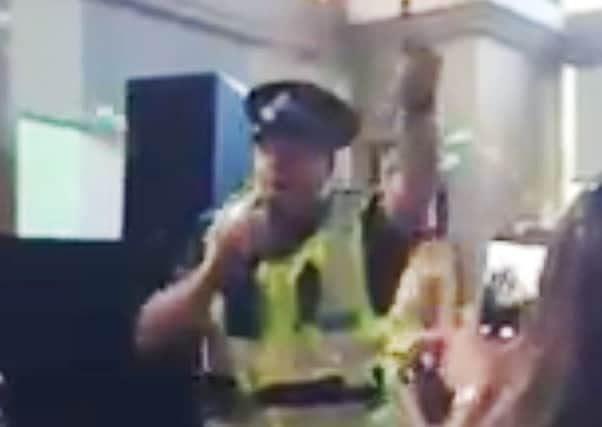Chris Marshall: Police beware use and abuse of social media


As is the modern way, Sgt Harris’ performance - complete with finger-wagging dance routine - went viral after he was filmed on a mobile phone.
The police officer and his colleagues had been called to deal with an alleged assault at the Waterloo Bar.
Advertisement
Hide AdAdvertisement
Hide AdAfter interviewing witnesses and checking CCTV, Sgt Harris was coaxed into performing the disco classic as his amused colleagues looked on.
This spontaneous act was not only effective community policing, but it also proved a huge PR boost for Police Scotland at a time when it is sorely needed.
The footage was taken by a member of the public and appeared online, presumably without the knowledge of Police Scotland HQ. That is its charm.
But at the risk of sounding like a curmudgeon, this is not the sort of coverage our police should be seeking out.
The national police force should not be actively pursuing shares and ‘likes’ on Facebook.
A video of police officers “accepting” the Running Man Challenge at Edinburgh Castle last month attracted huge media coverage and has now been watched more than 200,000 times on YouTube.
It’s the sort of thing which will no doubt eventually become a totally unfair and misleading internet meme juxtaposing American police brutality with Scotland’s couthy cops.
After I had stopped cringing, my first reaction to the video was to hope no one was having their bag snatched as five of Scotland’s finest danced about like lemons on the castle esplanade.
Advertisement
Hide AdAdvertisement
Hide AdTo be fair to Police Scotland, they are not the only force which indulges in this sort of thing.
Yes, it’s harmless and it’s fun, but is it strictly necessary?
There will be those in the police and outside who argue the use of social media is an effective way of building bridges and improving community relations, particularly with the young.
That is undoubtedly the case, as is the use of Facebook and Twitter to launch crime appeals and help find missing persons.
Contrived social media campaigns, such as tweeting a picture of a police cell as a warning to anyone planning on some alcohol-fuelled anti-social behaviour, is a different matter.
Police Scotland has a number of Twitter and Facebook accounts, as well as its own dedicated You Tube page, where it posts sober public safety messages alongside the likes of the Running Man Challenge.
The adoption of social media has been a massive boon for the force. During the hunt for the man who murdered Irish nurse Karen Buckley in Glasgow last year, police were able to reach millions using Facebook - a powerful new weapon in their armoury.
This is the sort of thing Police Scotland should be using social media for.
Advertisement
Hide AdAdvertisement
Hide AdYes, there’s a place for levity but not when it’s contrived and detracts from the job in hand.
In terms of building community relations, that’s a job which should be left to police officers themselves.
If Sergeant Harris is anything to go by, the force is in safe hands in that respect.